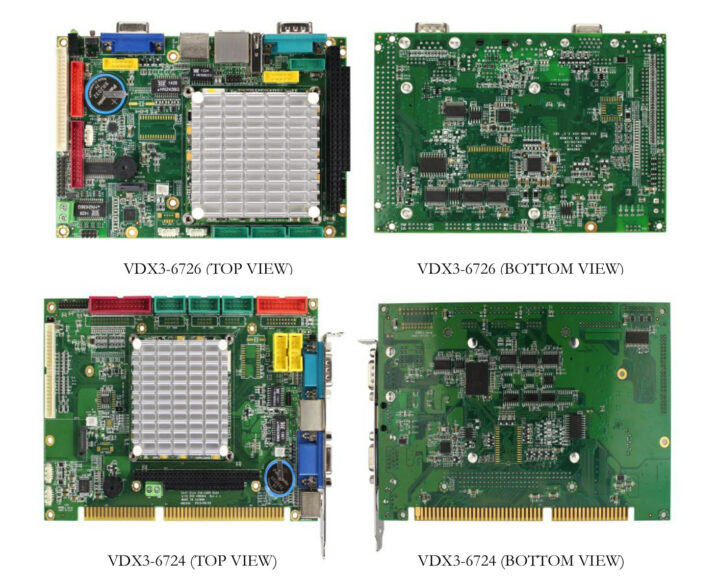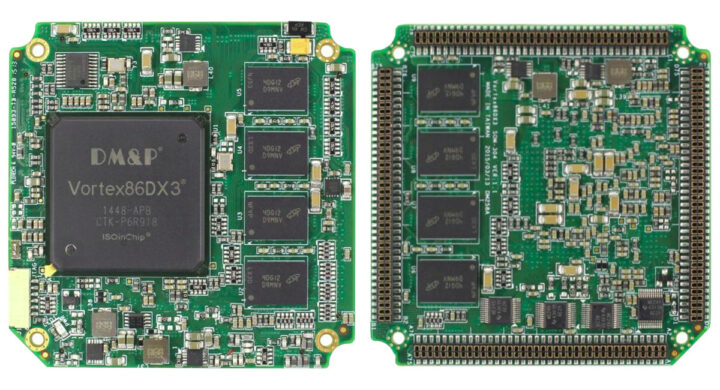DM&P Vortex86DX3 is an x86 embedded processor launched in 2015 that we’ve previously found in single board computers and mini PCs, but I’ve just noticed ICOP was offering the SOM304D3 system-on-module based on the single and dual-core versions of the Vortex86DX3 SoC.
The SOM304D3 is available with 1 or 2GB DDR3 RAM, works in a wide temperature range (up to -40°C to +85°C), and is designed for space-constrained industrial applications, especially those requiring legacy interfaces like ISA, IDE, and/or a parallel port (aka printer port).
SOM304D3 specifications:
- SoC – DM&P Vortex86DX3 single or dual-core x86 processor @ 1 GHz, 2D GPU
- System Memory – 1GB or 2GB DDR3
- Storage – Optional 4GB eMMC flash; SPI flash for AMI BIOS
- 4x 76-pin board-to-board connectors:
- Storage – SATA 1.0, IDE, SD
- Display
- VGA up to 1920 x 1080 @ 60Hz
- TFT LCD up to 1024 x 768 @ 60Hz
- Audio – 1x HD audio
- Networking – 2x 10/100M Ethernet
- USB – 4x USB 2.0
- Up to 80 GPIO or up to 9 UART, SPI, I2C, PWM, LTP (Parallel Port), up to 3 PWM
- Up to 8x ADC
- Expansion – 2x PCIe 1.1, 1x 16-bit ISA
- Misc – PS/2 keyboard and mouse interfaces, plus “4S/4U”, but I have no idea what this is…
- Power Supply – +5V DC @ 1,300mA (Typical)
- Dimensions – 70 x 70 x 10.5 mm (without cover)
- Weight – 25 grams
- Temperature Range – -20°C to +70°C or -40°C to +85°C (option)
As an x86 platform, the module supports plenty of – usually older – operating systems: FreeDOS, DOS 6.22, PCDOS 7.1, DR-DOS, x-DOS, OS/2, Windows 7, Windows Embedded Standard/Compact 7, Windows Embedded CE 6.0, Windows XP Professional/Embedded, POS Ready (WePOS), embedded Linux, QNX, VxWorks, FreeBSD.
 ICOP also offers at least two carrier boards for evaluation: the VDX3-6726 SBC and the VDC3-6724 board with an ISA interface.
ICOP also offers at least two carrier boards for evaluation: the VDX3-6726 SBC and the VDC3-6724 board with an ISA interface.
I found out about the board in a January 2022 press release, but the module is a bit older than that since the product page provides documents and drivers dated from 2018. The SOM304D3 system-on-module sells for $260 with 1GB RAM on ICOP online store, while the a complete kit with VDX3-6726 and cables goes for $372.

Jean-Luc started CNX Software in 2010 as a part-time endeavor, before quitting his job as a software engineering manager, and starting to write daily news, and reviews full time later in 2011.
Support CNX Software! Donate via cryptocurrencies, become a Patron on Patreon, or purchase goods on Amazon or Aliexpress. We also use affiliate links in articles to earn commissions if you make a purchase after clicking on those links.






Does DM&P get a x86 license from Intel?
It’s apparently based on an older, original design from the 90s:
https://www.cnx-software.com/2022/03/31/vesa-compatible-mini-pc-is-powered-by-vortex86dx3-x86-processor/#comment-591439
Haven’t the original patents already run out?
Few years ago my company bought industrial pc with some Vortex86 board in order to be able to run some old Win98 process control software. Unfortunatelly, it turned out that Vortex86 board was 486 and not Pentium, which was needed for the software to run.
The DX3 was finally made i686-compatible. I think their naming scheme doesn’t help much guessing when progress are made, to be honest.
A dual-core x86 at 1 GHz could still have plenty of usages. We’ve been using some Pentium-M 1.8 GHz in our network appliances for several years, and these CPUs were absolutely awesome. Fast and cold. I had one in a laptop, I remember completely disabling the fan and being able to build kernels with no heating issues while the CPU had pentium3-class performance.
A large number of appliances don’t even need that level of performance and could be fine with such tiny SoCs that can run legacy software.
Old and slow — which would just fine for a lot of applications if it was cheap — which it is not.
These aren’t geared towards hobbyists – these are meant for companies/government entities looking to keep legacy systems operational where upgrading would be cost/time prohibitive. To such entities old/slow doesn’t matter and a few hundred dollars for an SBC to keep their legacy systems running is a rounding error. Whether it makes sense for those entities to dump those legacy systems and invest in upgrading/future proofing is besides the point.
This really is for people with more legacy concerns than anything else (money, brains, design skill, etc.).
Damn, I need 2 ISAs!
Hmm.. looks like a suitable option for a CM4 compatible prototype
I feel like development of those Vortex SoCs stagnated a long time ago. Sure, I understand the market for these isn’t about raw performance, but still. In 2022 i’d expect a bit more of everything: clocks, interfaces etc. Even that BGA package is so old-school.
The design is 2019 but I agree it’s still lagging behind a bit. The SoC is in 40nm, it could probably have been trimmed to 28nm or so. The interfaces could be refreshed: PCIe 1.1, SATA 1, USB 2, 10/100, … One of the difficulties in upgrading interfaces is to preserve support for older OSes. Some modern devices that didn’t exist by then have little chances of working well if nobody ever tested the combinations, and that can be a real problem.
However I’m not seeing an issue with the BGA package here, it’s thanks to this that the board reaches a high density. They could have further improved the density by supporting a package-on-package approach with the RAM on top but I don’t think it’s what their main customers are looking for.
For those interested I’ve found an article from an owner who collected some information and cpuinfo outputs from this SoC: https://tortoiseit.blogspot.com/2019/04/information-on-dm-vortex86dx3-soc.html